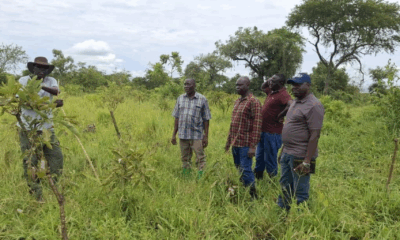Tourism
World Chimpanzee Day: Celebrating the Strength and Fragility of Chimp Memory
The more we try to understand chimpanzees, one of our closest relatives, the more we find ourselves humbled by the richness and complexity of their lives — and of their intelligence.
Today, on World Chimpanzee Day, we look back at some of the latest studies that reveal facets of these great apes’ long, powerful memories.
Finding hidden ant nests
Previous research has confirmed that chimpanzees (Pan troglodytes) in the wild remember where their favourite fruit trees are, season after season. A recent study that monitored chimpanzees in Dindefelo Community Nature Reserve in Senegal has found that chimps also remember the locations of hidden underground ant nests for years. They repeatedly return to these sites, using their sight, smell, taste and touch to detect the availability of ants in the nests, Mongabay contributor Charles Mpaka reported in February 2025.
“We realized that the fact that the chimpanzees in our study were going back to the same ant nests, even though these were almost never visible, was really important because it suggested that their repeated ant nest visits were not opportunistic, but rather that the chimpanzees relied on their memory to find the nests and revisit them over and over again,” said study co-author R. Adriana Hernandez-Aguilar.
Remembering friends and family
Another study found that chimpanzees also have rich, long social memories. In an experiment, zoo chimpanzees and bonobos were shown images of former group mates and of individuals who were strangers. The participating chimps and bonobos paid more attention to the known faces than those of the strangers, suggesting the great apes can remember friends and family even when they’ve been apart for years, Mongabay’s Malavika Vyawahare reported in September 2024.
They also paid more attention to individuals they’d shared a more positive relationship with previously, compared to those with whom they hadn’t been very close. “Their social relationships seem to shape their memory,” said study lead author Laura Simone Lewis.
Losing the love language
The flip side of this culture of building up long-term memories is that the loss of individuals in a population can lead to the slow erosion of learned practices and traditions. A recent study found that a group of chimpanzees in Côte d’Ivoire’s Taï National Park that lost many male individuals to poaching over the past decades has lost the distinct auditory mating gestures the males would use to attract females, contributor Ryan Truscott reported in March 2025.
“We’ve shown that a behaviour that is learned can be lost,” said study lead author Mathieu Malherbe.
This loss of a mating signal suggests other socially learned skills, such as using tools to access insects in hard-to-reach places, are also at risk of disappearing as chimps are lost to poaching or habitat destruction. “If you go and disrupt, basically, the possibility for individuals to pass on any knowledge, then you have a huge issue,” Malherbe said.
Comments



























